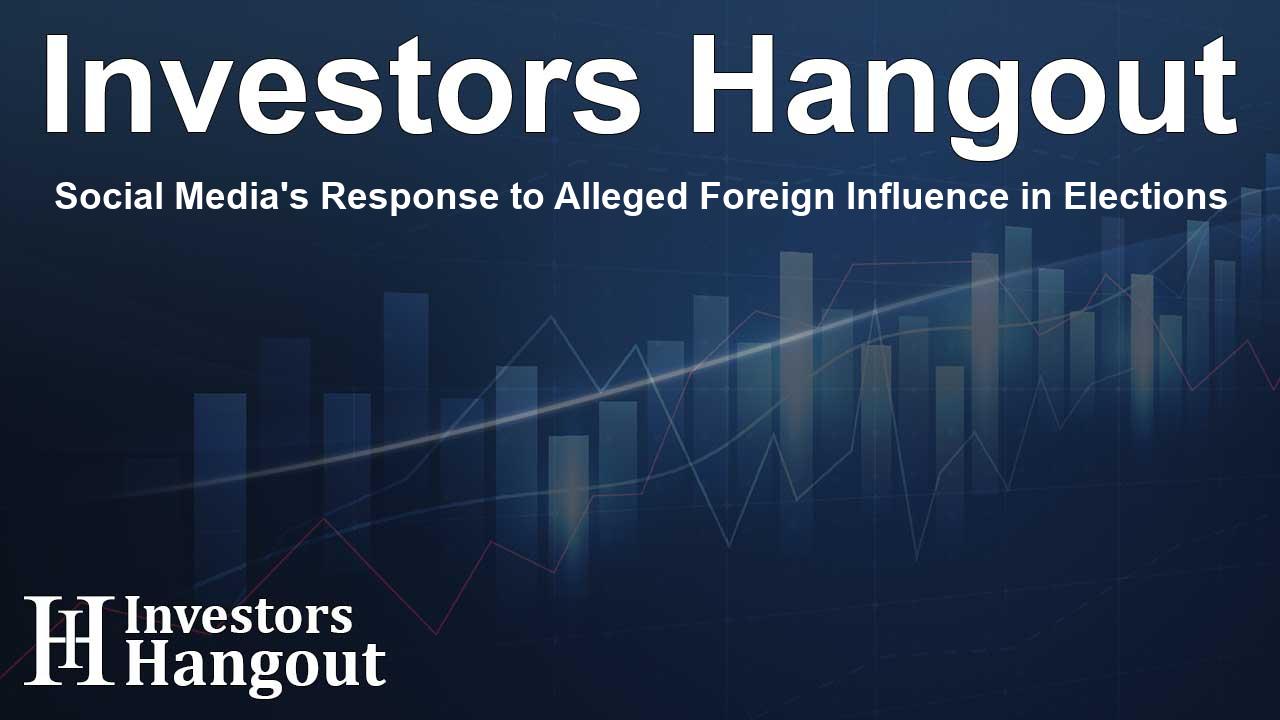Social Media's Response to Alleged Foreign Influence in Elections

Concerns Over Social Media and Foreign Influence Networks
Recently, the landscape of social media has been scrutinized due to allegations involving foreign influence on democratic processes. With U.S. authorities accusing two employees of a Russian state media network of orchestrating an online campaign to sway the upcoming presidential election, the actions of social platforms come under the microscope.
Access to Content from Tenet Media
Despite serious accusations, nearly 4,000 posts by Tenet Media, a company intricately linked to these claims, remained live on TikTok, untouched. The same can be said for their extensive content on Instagram and over 4,000 posts on platform X, alongside various posts on Facebook (NASDAQ: META) and the video-sharing site Rumble, as found in a recent review.
YouTube's Action Against Tenet Media
Interestingly, among all the major platforms, only Alphabet (NASDAQ: GOOGL)’s YouTube took measures against Tenet Media by removing the primary channel and several others associated with the owner recently. Moreover, a paid ad that Tenet had run on Instagram was disabled shortly after the allegations surfaced, indicating at least some level of response from the platforms involved.
Lack of Communication from Social Media Platforms
When approached for comments regarding their strategies for managing the allegations, none of the major social media platforms offered a clear plan. Meta, which oversees platforms like Facebook and Instagram, did not clarify if they had taken down the controversial ad, nor did Tenet Media respond to inquiries from reporters.
New Challenges for Social Media Companies
This situation presents a unique challenge for social platforms as it reflects a more nuanced form of influence. Instead of overt, state-owned media, these influence operations are concealed within the fabric of American cultural voices, aiming to manipulate public opinion under the radar. Disinformation experts note that Russia has effectively adapted its tactics, reminiscent of Cold War strategies, now utilizing unsuspecting U.S. social media personalities to impact voter sentiments.
The Legal Implications Behind Foreign Influence
The gravity of these allegations is emphasized by the involvement of the U.S. Justice Department, which revealed that two RT employees had collaborated with foreign nationals to establish Tenet Media in Tennessee. This arrangement allegedly funneled substantive financial support towards American commentators tasked with generating content designed to fuel political divides. It has come to light that this company paid significant amounts to various production houses for their promotional work while keeping its funding sources undisclosed from the influencers.
Branded Content and Its Challenges
The online environment complicates the already intricate nature of media regulations. Platforms like Meta and TikTok require users to clearly mark any sponsored content, but the concealed relationships between influencers and foreign networks pose a dilemma that traditional moderation rules may not adequately address. The interactions involve real individuals and ideas, raising concerns about censorship and the balance between maintaining free speech and protecting electoral integrity.
Social Media's Struggle with Content Moderation
As the debate over moderation intensifies, social media companies find themselves in a precarious position. Several conservative figures have claimed that platforms exhibit bias against their viewpoints, urging moderation that facilitates rather than restricts their expressions. Leaders in tech, like Meta's CEO Mark Zuckerberg, are attempting to navigate these troubled waters by expressing an openness to concerns voiced by these groups while seeking to implement equitable policies.
Future Directions for Social Media Policy
Experts like Olga Belogolova advocate for a measured approach in dealing with the complexities presented by the current digital landscape. This includes long conversations about the standards that should apply as platforms contend with potentially harmful influences without stifling legitimate expression. Social media is left grappling with the pressing question: how do we effectively manage the intersection of foreign influence and American political discourse?
Frequently Asked Questions
What allegations are made against Tenet Media?
Tenet Media is accused of coordinating with Russian state media to influence the U.S. presidential election through various social media platforms.
Which social media platforms are involved in this case?
Platforms like TikTok, Instagram, Facebook, and YouTube have been discussed in context with Tenet Media's influencer network.
How has YouTube responded to Tenet Media's content?
YouTube has taken action by removing Tenet Media’s main channel and several other related accounts.
What financial involvement does Tenet Media have with commentators?
Allegations suggest that Tenet Media paid prominent conservative commentators significant sums to create divisive content without revealing the source of the funding.
Why is this situation considered different from previous foreign influence campaigns?
The case is unusual because it involves direct payments to American personalities for content, unlike traditional foreign propaganda that typically uses state-run media channels.
About The Author
Contact Dylan Bailey privately here. Or send an email with ATTN: Dylan Bailey as the subject to contact@investorshangout.com.
About Investors Hangout
Investors Hangout is a leading online stock forum for financial discussion and learning, offering a wide range of free tools and resources. It draws in traders of all levels, who exchange market knowledge, investigate trading tactics, and keep an eye on industry developments in real time. Featuring financial articles, stock message boards, quotes, charts, company profiles, and live news updates. Through cooperative learning and a wealth of informational resources, it helps users from novices creating their first portfolios to experts honing their techniques. Join Investors Hangout today: https://investorshangout.com/
The content of this article is based on factual, publicly available information and does not represent legal, financial, or investment advice. Investors Hangout does not offer financial advice, and the author is not a licensed financial advisor. Consult a qualified advisor before making any financial or investment decisions based on this article. This article should not be considered advice to purchase, sell, or hold any securities or other investments. If any of the material provided here is inaccurate, please contact us for corrections.
